https://philaholisticclinic.com/treatment-for-sjogrens-syndrome/
Treatment for Sjogren’s syndrome
Treatment for Sjogren’s syndrome is palliative, which means it aims to relieve the symptoms, but not to cure the disease. Once you’ve been diagnosed with Sjögren’s syndrome, you and your doctors will come up with a plan that meets your needs; the treatment of Sjögren’s syndrome will largely depend on the extent and severity of symptoms. Numerous symptoms of Sjogren’s syndrome can be managed with over-the-counter pharmaceutical products. Others may require prescription medications and minor surgery.
Some people will only experience dry eyes and mouth, while others will experience systemic symptoms such as difficulty concentrating, memory lapses, fatigue, and joint pain. The disease can also affect blood vessels and internal organs such as the lungs and kidneys in a small number of patients.
Treatment for Sjogren’s syndrome depends on the parts of the body affected. Many people manage the dry eye and dry mouth of Sjögren’s syndrome by using over-the-counter eye drops and drinking water more frequently. But some people need prescription drugs or even surgery.
There is currently no cure for Sjögren’s syndrome. Researchers continue to explore ways to lessen complications through studies that include finding better methods to assess disease activity and severity and testing new drugs.
Lots of people can get decent relief for dry eyes with the use of artificial tears throughout the day and a gel at night. Some patients may have inflammation of the eyelids (blepharitis) and benefit from using warm compresses and eyelid cleansers and gentle eyelid massage to relieve blocked sebaceous glands in the eyelids. Others may require prescription eye drops.
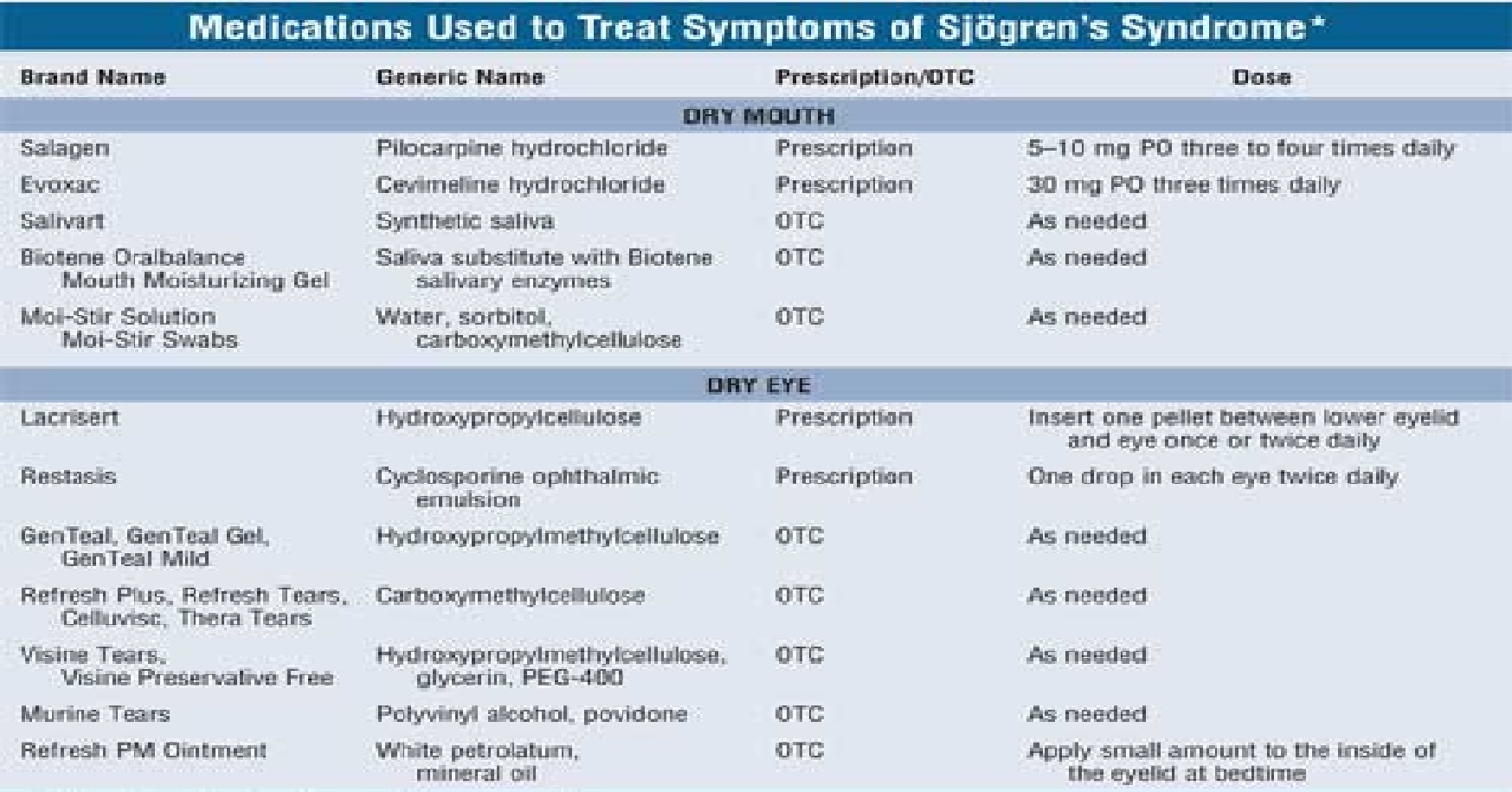
Some patients find it helpful to wear sunglasses or goggles or to add shields to the sides of their eyeglasses. These options help reduce tear evaporation, protecting your eyes from wind, air, and airborne particles.
As with dry eye treatment, there are over-the-counter options for dry mouth symptoms. They include:
- Suck on sugar-free candies and chew sugar-free gum. If you don’t find this effective, prescription medications are available that can help increase your saliva production.
- Drinking water throughout the day is the easiest way to relieve dry mouth. An artificial saliva product, like a spray or lozenge, can also help.
- People with Sjogren’s syndrome may experience dryness in other areas, including the lips, nose, skin, and vagina.
- Vaseline and lip balms can help with dry lips.
Congested nasal passages and a dry nose increase the need to breathe through the mouth, which can make a dry mouth worse. Saline nasal sprays can be helpful. Do not ignore other possible causes of congestion, such as allergies and sinus infections.
Dry skin usually improves with regular use of skin lotion throughout the day, especially after a bath or shower.
Some women suffer from vaginal dryness, especially after menopause. Using products for vaginal dryness, such as vaginal moisturizers, estrogen cream, vitamin E oil, hyaluronic acid suppositories, and vaginal lubricants can be beneficial. Applying appropriate artificial lubricant to both partners can also help prevent painful intercourse.
Medications for Sjogren’s syndrome treatment
Depending on your symptoms, your doctor may suggest medications that:
- Reduce eye inflammation. Prescription eye drops such as cyclosporine (Restasis) or lipitegrast (Xiidra) may be recommended by your eye doctor if you have moderate to severe dry eyes.
- Increase saliva production. Pharmaceutical medications such as pilocarpine (Salagen) and cevimeline (Evoxac) may stimulate the creation of saliva and sometimes tears. Side effects may include sweating, abdominal pain, hot flashes, and frequent urination.
- Elimination of specific complications. If you have symptoms of arthritis, non-steroidal anti-inflammatory drugs (NSAIDs) or other arthritis medications may help. Fungal infections in the mouth should be handled with the use of regular antimycotic drugs.
- Treatment of systemic symptoms. Hydroxychloroquine (Plaquenil), a drug used to treat malaria, often helps with Sjögren’s syndrome. Drugs that suppress the immune system, such as methotrexate (Trexall), may also be prescribed.
Surgical treatment for Sjogren’s syndrome
A minor procedure to seal the tear ducts that drain tears from the eyes (pinhole occlusion) could help relieve dry eyes. For this purpose, collagen or silicone caps are implanted into the canals and vessels to help preserve tears.
What is Sicca syndrome?
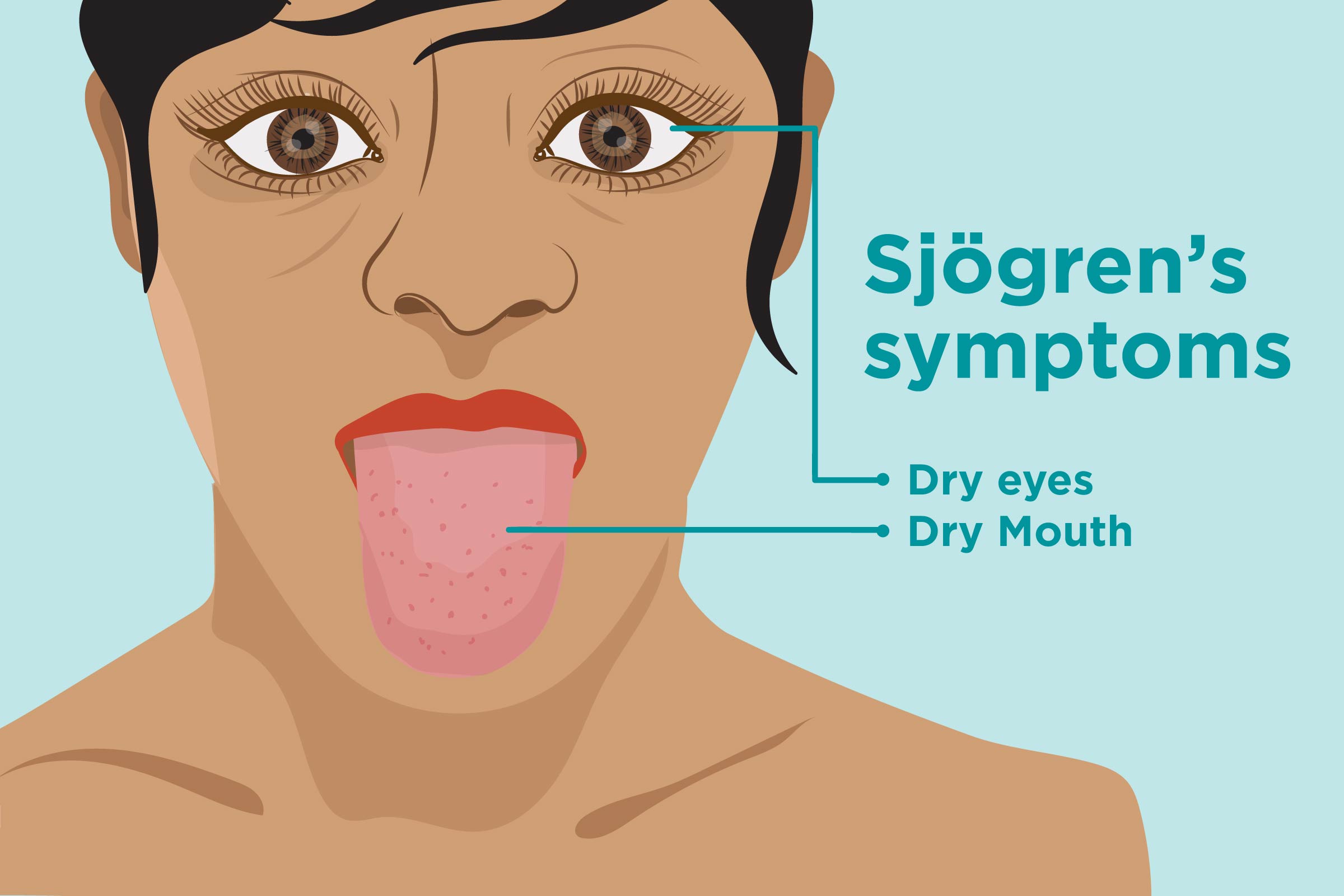
Sjogren’s syndrome also known as Sicca syndrome is an autoimmune disease.
This means that your immune system attacks parts of your own body by mistake. In Sjogren’s syndrome, the immune system attacks exocrine glands, the glands that produce tears and saliva. This causes dry mouth and dry eyes. Sometimes other Bartholin’s glands are also affected.
Derived from the Latin word sicca, meaning “dry,” it is a condition that directly affects your immune system. It can potentially affect the quality of your daily life, and your treatment focuses on relieving symptoms.
Sicca syndrome can affect any organ in the body that produces moisture, including the throat, nasal passages, skin, sinuses, and vagina. It is further marked by the overproduction of antibodies that actively destroy their own tissues.
Sjogren’s syndrome is a relatively common condition that primarily affects the eyes and salivary glands, but can also affect different parts of the body.
Sjogren’s syndrome is an autoimmune disease, meaning it occurs as a result of a malfunction in the immune system.
Your immune system is designed to recognize and attack foreign objects (like bacteria and viruses) to keep you healthy. However, in Sjogren’s syndrome, your immune system attacks the glands that produce tears and saliva. This prevents the glands from working properly and causes dryness in the mouth, eyes, or other tissues.
The condition can progress slowly, so it can take years for the typical symptoms of dry eyes and dry mouth to appear. However, it can also start quickly. Symptoms can be mild, moderate, or severe, and progression is often unpredictable.
Women are most often affected by Sjögren’s syndrome. There is no cure, but it can be managed effectively. In rare cases, organs such as the liver and kidneys may be involved, which can increase the severity of the disease. In a small number of people, Sjogren’s syndrome may be associated with lymphoma (cancer of the lymph nodes).
Causes of Sicca syndrome
It is not known what are the causes of Sjogren’s syndrome. It seems your genes may play a role in conjunction with an external trigger such as a bacteria or virus. It is also more likely to affect people suffering from conditions such as rheumatoid arthritis, scleroderma, and lupus.
Scientists aren’t sure why some people develop Sjogren’s syndrome. Certain genes put people at higher risk for the condition, but it appears that a triggering mechanism – such as infection with a particular virus or strain of bacteria – is also necessary.
With Sjogren’s syndrome, your immune system first targets the glands that produce tears and saliva. But Sjogren’s syndrome can also harm other systems of your organism, such as:
- joints
- thyroid gland
- kidneys and bladder
- liver and gallbladder
- lungs
- dermis
- neural tissues.
Risk factors that increase the risk of getting Sjogren’s syndrome
Sjogren’s syndrome commonly appears in individuals with one or more recognized risk factors, including:
Age. Sjogren’s syndrome is usually diagnosed in people over the age of 40.
Gender. Females are significantly more expected to develop Sjogren’s syndrome.
Rheumatic disease. It’s common for people with Sjogren’s syndrome to also have a rheumatic condition — such as rheumatoid arthritis or lupus.
Sjogren’s syndrome symptoms
The two main Sjogren’s syndrome symptoms are:
- Dry eyes. Your eyes may burn, itch, or be soiled – as if there is sand in them.
- Dry mouth. Your mouth may feel full of cotton wool, making it difficult to swallow or speak.
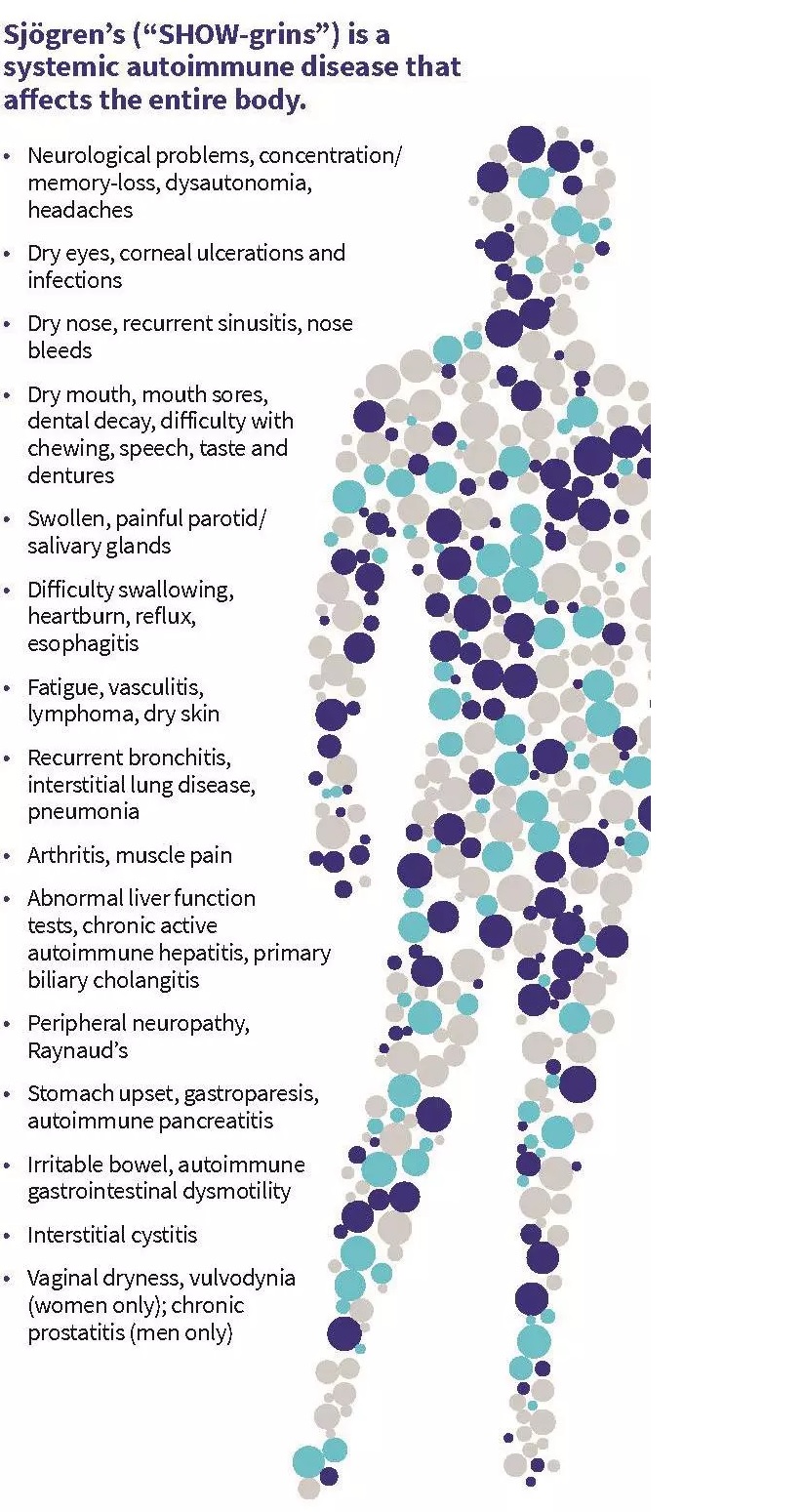
Some patients with Sjogren’s syndrome also suffer from one or more of the following Sjogren’s syndrome symptoms:
- Joint pain, swelling, and stiffness
- Enlarged salivary secretors – specifically those at the back of the jaw and in front of the ears
- Skin rashes or dry skin
- Vaginal dryness
- A persistent dry cough
- Long-term fatigue
Complications of Sicca syndrome
The most common complications of Sjogren’s syndrome affect your eyes and mouth.
- Tooth cavities. Because saliva helps protect teeth from the bacteria that cause tooth decay, you are more prone to developing tooth decay when your mouth is dry.
- Yeast infections. Individuals that suffer from Sjogren’s syndrome are considered likely to develop oral thrush, a yeast infection in the mouth.
- Vision problems. Dry eyes can lead to sensitivity to light, blurred vision, and corneal damage.
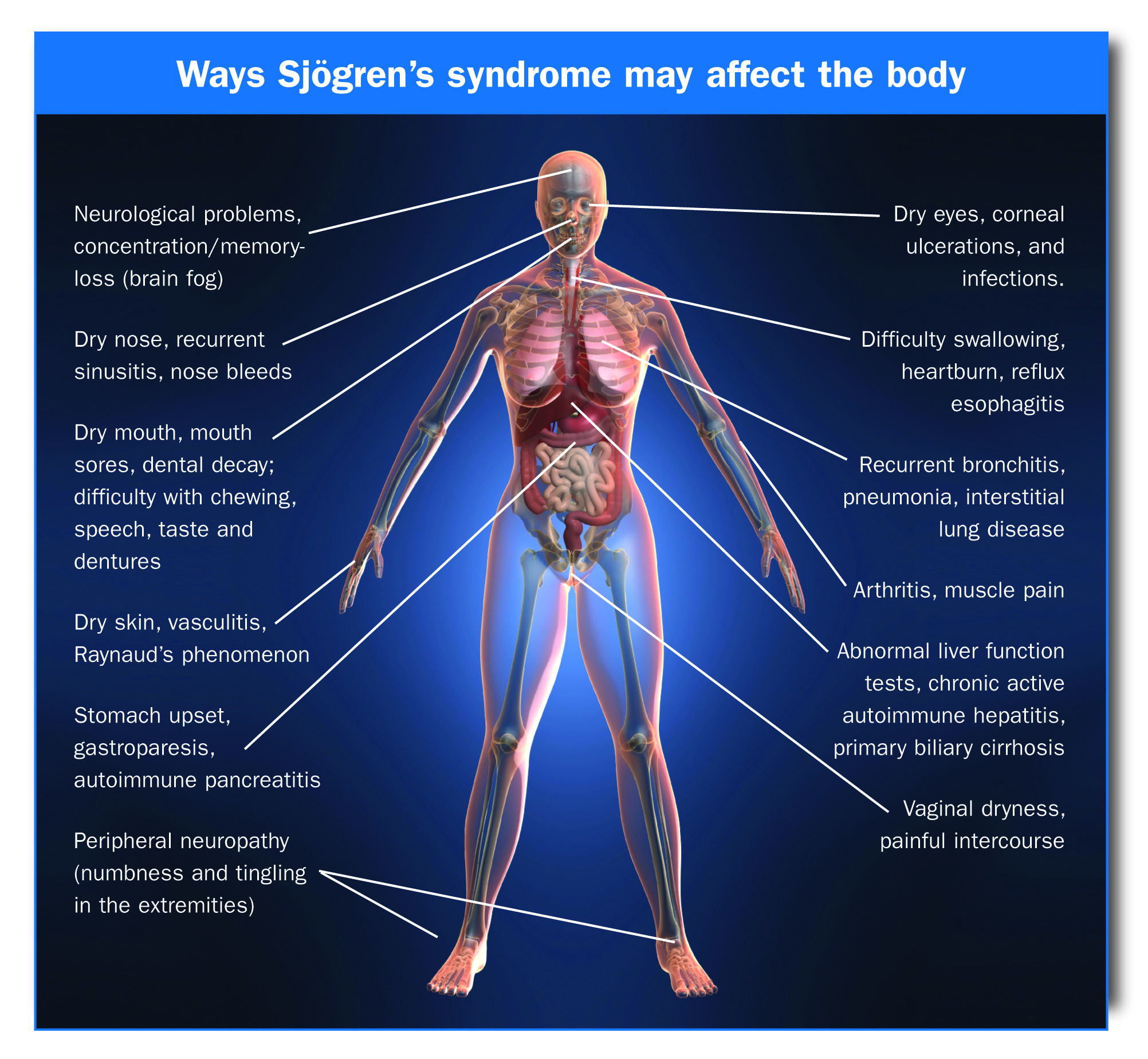
Less common complications of Sjogren’s syndrome may involve:
- lungs, kidneys, or liver. Inflammation can cause pneumonia, bronchitis, or other lung problems; lead to problems with kidney function and cause hepatitis or liver cirrhosis.
- lymph nodes. A small percentage of people with Sjogren’s syndrome will develop cancer of the lymph nodes (lymphoma).
- You could develop numbness, tingling, and burning in your hands and feet (peripheral neuropathy).
How to diagnose Sjogren’s syndrome
Early diagnosis and treatment are important to prevent future complications. It can be difficult to diagnose Sjogren’s syndrome as symptoms can mimic those of other conditions such as lupus and fibromyalgia. For instance, dry mouth and dry eyes can also be the side effects of some pharmaceutical drugs taken for other medical problems, such as depression and high blood pressure.
Diagnosis of Sjogren’s syndrome is often done by a rheumatologist (a specialist who treats conditions that affect the joints, muscles, and bones) and involves a series of tests, which can include:
Schirmer’s test: A special blotting paper held over the eye is used to assess the degree of tear production
- eye examination – including the use of special dyes
- biopsy – a histological test during which a tiny piece of salivary secretor is surgically removed and examined by a pathologist for the existence of atypical abnormal cells and tissues.
- blood tests: These can be used to check the levels of particular immune system cells in the blood and to check for kidney or liver problems.
A natural approach to the treatment for Sjögren’s syndrome
Natural remedies for Sjogren’s syndrome treatment include phytotherapy (aka medical herbal medicine), which is a research-backed medical practice but takes a more traditional approach using medicinal herbs. Because Sjogren causes dry eyes and mouth, some common foods and herbs, such as ginger, apples, chamomile, and cucumber, contain elements that help produce the fluids your body needs.
Most natural remedies for Sjogren’s syndrome treatment rely on supporting the body’s ability to lubricate itself, especially in the eyes and mouth.
In addition, natural remedies for Sjogren’s syndrome treatment will help modulate, or “calm down”, your overactive autoimmune system so that the disease process can go into remission.
If we find the cause, I will also make sure that the cause of your Sjogren is resolved.
One study, published by Hu, Qian, Guo, Zhang, et al., Presents a large-scale six-week double-blind study of patients with Sjogren’s syndrome treatment with natural medications that showed significant improvements in dry mouth and eyes.
Self-management as a form of treatment for Sjögren’s syndrome
There are many things you can do to manage Sjögren’s syndrome, including:
- Avoid dry and dusty environments.
- Avoid drafts and windy conditions.
- Wear safety goggles when you are outdoors in the wind and sun.
- Sip water regularly or suck on ice cubes.
- Avoid strong soaps, which can dry out the skin.
- Try increasing the humidity in your home.
- Exercise regularly, eat a healthy diet, quit smoking, and reduce stress to improve your overall health and well-being.
- Eat soft, moist foods if you have difficulty swallowing.
- Eat more often and in small portions to stimulate salivation.
- When showering or bathing, use warm (not hot) water.
- Chew sugar-free gum to stimulate salivation.
- Avoid salty, sour, or spicy foods and carbonated drinks, which can be painful if you have a dry mouth.
- Practice good oral hygiene and visit your dentist more often.
Acupuncture for Sjogren’s syndrome treatment
Acupuncture has been used in China since at least 400 BC. This is used to treat a wide variety of medical conditions and is offered in Chinese hospitals alongside “orthodox” medicine. Corresponding to acupuncture philosophy, there is a web of meridians running through the body, carrying ‘qi’ energy, which may be vaguely translated as “life force”. Modern research using PET scanners showed that the qi system is actually a network of subatomic particles (protons of hydrogen to be precise). using a brain scanner, we can see that when the needles are inserted into the key acupuncture points, some specific sections of the brain become involved.
For example, when a needle is inserted into a point on the little toe which is used to treat eye problems, the visual cortex (the part of the brain associated with vision) becomes active. when a needle is placed into an acupoint on the hand used to deal with pain, several pain control centers in the brain turn out to be in force.
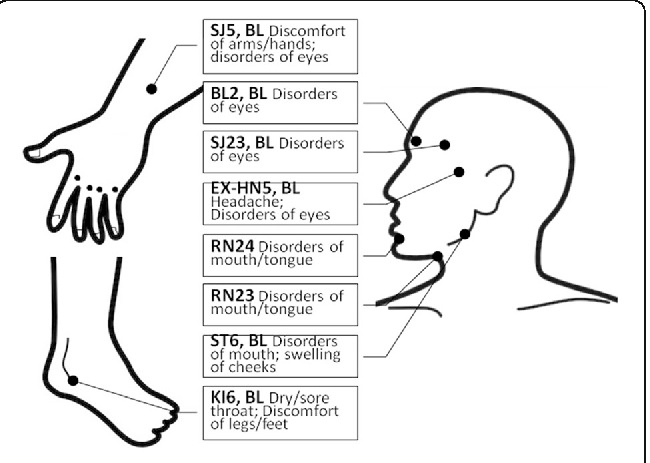
Using the latest research methods, a team from the USA The Navy is looking into how acupuncture can be used to solve the problem of dry mouth or “xerostomia”. The team found that piercing a combination of three acupuncture points on each ear, plus one on each arm, resulted in dry mouth in 80% of patients to report a marked increase in salivation. In many patients, Lack of salivation was caused by radiation injury salivary gland after radiation therapy for head and neck cancer. In some patients, dry mouth was caused by Sjögren’s syndrome.
Some people claimed that the cure was “all in the mind”, and there was no actual increase in salivation. A Scandinavian group of researchers decided to test whether the treatment actually increased the production of saliva. They put cotton balls in the patients’ mouths and weighed them before and after acupuncture.
They found that after the treatment, the cotton balls weighed more than the untreated control group, suggesting that acupuncture increased salivation, which made the cotton balls heavier.
So how does acupuncture increase salivation? Acupuncture is thought to help the brain move from a “fight or flight” state (sympathetic dominance) to a “relaxed” state (parasympathetic state).
dominance). When we are in “relax” mode, the production of saliva tends to increase. Following the US research, three hospitals in South West England decided to try acupuncture treatment on cancer patients who had lost salivary function due to radiotherapy. Last year I visited hospitals to see the treatments carried out and discussed the results with staff and patients.
Acupuncture treatments for Sjogren’s syndrome are given to approximately six patients seated in a circle. The needles are inserted and left in place for about 20 minutes, during which patients can talk to each other. The results obtained were similar to those in the United States, with at least four out of five patients reporting increased salivation. Many patients said the treatments allowed them to eat more types of food, and others said they no longer needed to constantly sip water.
Acupuncture combined with herbal medicine outperforms an immunomodulatory drug for the treatment of Sjögren’s syndrome. Sjogren’s syndrome is an autoimmune disease in which the immune system attacks the lacrimal and salivary glands, causing impaired tear and saliva production. Researchers (Li et al.) compared the therapeutic effects of acupuncture and herbs with hydroxychloroquine.
A group of traditional Chinese medicine (TCM) received acupuncture and herbal formula Jie Du Tong Luo Sheng Jin Tang (toxin resolution channel releasing decoction generating liquid). A control group received treatment for Sjogren’s syndrome in the form of pure drugs such as hydroxychloroquine (an immunomodulatory and antimalarial drug) in tablet form. The acupuncture plus herbs group treatment for Sjogren’s syndrome achieved a total treatment efficacy rate of 83.33%. The drug group achieved a total effective rate of 60.00% (p<0.05).
Overall, traditional Chinese medicine appears to be a solid approach to managing Sjögren’s syndrome. And the evidence confirms the impact of these treatments. Although more research is needed to analyze the full extent of these ancient Chinese practices, it is definitely worth a try.
Homeopathic treatment for Sicca syndrome
Homeopathic medicine is one of the most prevalent holistic practices of treatment. The selection of homeopathic remedies for Sjögren’s syndrome is based on the theory of individualization and similarity of symptoms using a holistic approach. This is the only way to restore a state of complete health by eliminating all signs and symptoms from which the patient suffers. The goal of homeopathy is not only the treatment of Sjögren’s syndrome but also the elimination of its underlying cause and individual susceptibility. With regard to medical treatment, several remedies are available for the treatment of Sjögren’s syndrome, which can be selected based on the cause, sensations, and modality of the complaints. For an individual selection of the drug and treatment, the patient should personally consult with a qualified homeopathic doctor.
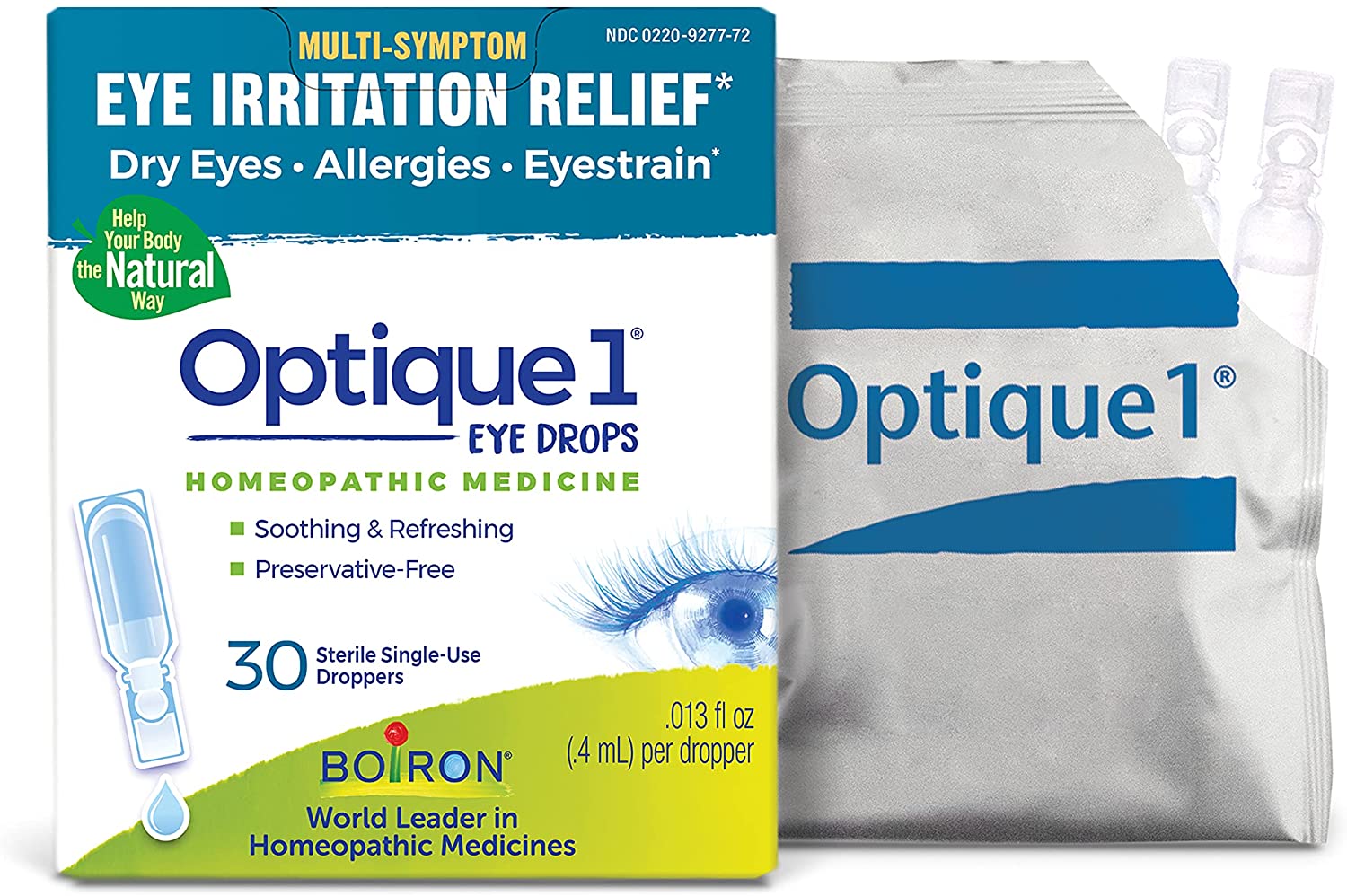
Sjogren’s Syndrome can be safely and effectively treated with homeopathic medicines. Homeopathic medicines treat Sjogren’s syndrome by moderating the overactive immune system. The homeopathic medicines for Sjogren’s syndrome are selected taking into account the affected part and the characteristic symptoms in each individual case. The primary symptoms that appear in most cases of Sjogren’s syndrome, including dry eyes and dry mouth, can be treated well with homeopathic remedies. Apart from that, the symptoms present in some cases such as joint pain, fatigue, dry itchy skin, dry cough, and vaginal dryness are also treated equally well. A homeopathic prescription requires a full assessment of the case, therefore these medicines should be used under the supervision of a homeopathic practitioner.
Some homeopathic medicines that have shown positive results or cover the symptom picture well in Sjogren’s syndrome are Nux Moschata, Tuberculinum, Silica, Brassica Nappus, Dulcamara, Antimonium Crudum, Cuprum, Folic Acid, Pulsatilla, Belladonna, Bryonia, Arsenicum, and Rhus.
Belladonna: Useful for managing dry eyes in Sjogren’s syndrome. In addition to dryness, there is redness of the eyes with itching. There is a burning, stinging and stinging sensation in the eyes. Belladonna is usually prescribed when there’s a feeling of sand in your eyes
Rhus Toxicodendron: Useful for joint pain in Sjögren’s syndrome. Pain, swelling, redness, heat in the joints with marked stiffness. Useful for crunches when stretching joints which can be improved by warm application. Recommended when joint pain is worse at rest and better with movement.
Arsenicum Album: Useful for Sjögren’s Syndrome where the person experiences extreme fatigue. There is weariness and weakness that prevails all the time and there is intense fatigue that makes you want to lie down constantly. Given when the slightest exertion may cause fatigue and there may be anxiety or restlessness.
Bryonia: Useful for cough in cases of Sjogren’s syndrome. There is a dry and spasmodic cough. Also, there is a tickling sensation in the throat that may be present along with a cough that can get worse after eating or drinking. Vomiting can also occur along with the cough. There is a pain in the head and chest that appears with a cough. There is dry mouth and lip chapping may be present. Also useful for joint pains that worsen with movement and improve with rest.
Nux Moschata: The main symptoms that point to this homeopathic remedy are cold extremities, extreme dryness of the mucous membranes, and skin. A strange sensation, with irresistible sleepiness. Indicanuria. General tendency to lose consciousness during acute attacks. Hypersensitive to smell; nosebleed, dark blood; dry, capped. The tongue adheres to the palate but has no desire for water. Saliva is like cotton. Toothache in pregnancy. Tongue numb, paralyzed. Dry throat. Paralytic weakness of intestines. Hugely dilated. The stool is soft and yet is unable to expel it, even with prolonged effort. Weakness during or after stool. Protruding piles.
Alumina: The very general condition associated with this drug is dryness of the mucous membranes and skin, and a tendency to muscle paresis. Sluggish functioning, heaviness, numbness and dizziness, and the characteristic constipation of alumina find the perfect remedy. A tendency to colds in the head and eruptions in lean, dry, lean individuals. The eyes are cold. The eyelids dry up, burn, wisely, thicken, deteriorate in the morning; chronic conjunctivitis. Dry, sore; food cannot pass, the esophagus has shrunk. It feels like a splinter or plug in the throat. Irritable and slack throat. It looks parched and glazed. Sore throat in thin people. Thick, stubborn mucus drops from the posterior nostrils. Constant tendency to clear the throat. Chapped and dry skin. Brittle nails. Unbearable itching while warming up in bed. He has to scratch until he bleeds; then it becomes painful. The fragility of the skin on the fingers.
Natrum Muriaticum: Great weakness; most weaknesses were felt in the morning in bed. coldness. The wasting is most noticeable in the neck. Great responsibility to take cold. Dry mucous membranes. Constrictive sensation in the whole body. Great weakness and tiredness. Super sensitive to all kinds of influences. Cough from tickling in the pit of the stomach, accompanied by stitches in the liver and jets of urine. Stitches across the chest. Cough, with explosive pain in the head. Shortness of breath, especially when climbing stairs (Calc). Whooping cough with a stream of tears with cough.
Treatment for Sicca syndrome in Philadelphia
If you read this article, you are visiting the website of the Philadelphia Holistic Clinic – the #1 naturopathic center in the City of Brotherly Love.

Our professional team, led by the medical doctor Victor Tsan provides the treatment for Sjogren’s syndrome using all available holistic techniques, including but not limited to Acupuncture, Ayurveda, Chinese medicinal herbology, Homeopathy, and Energy healing such as Reiki.
For an appointment, contact the clinic or use our online scheduling application by scanning the QR code below.
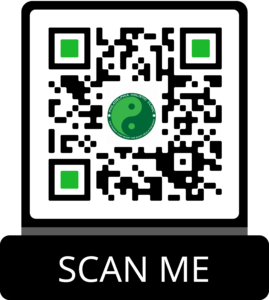
Comments
Post a Comment